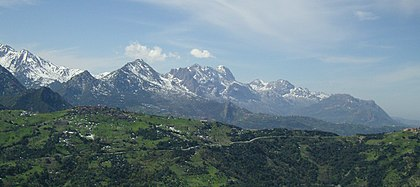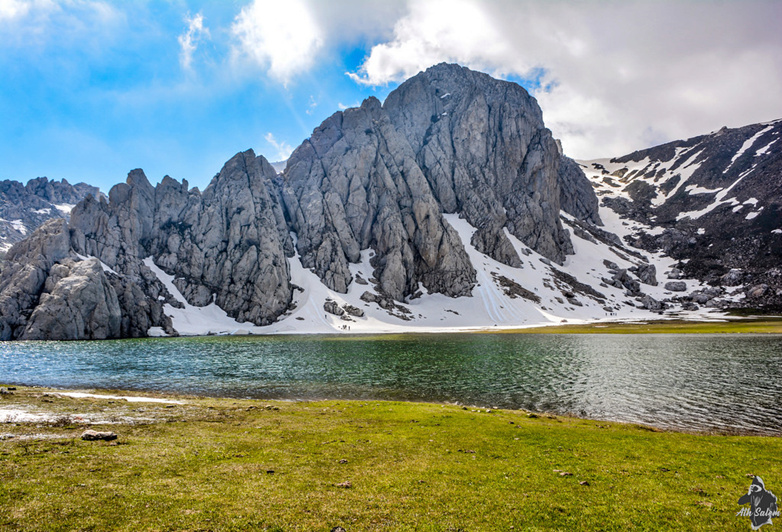The value of the mountain in Kabyle poetry

In the minds of the Kabyles, their souls and their hearts, the mountain is always omnipresent. It’s so true that among themselves they proudly call themselves d imesdurar (Those of the mountain) or even “mmi-s n udrar” (son of the mountain). Everything in their experience, the profane as well as the divine, gravitates around this Mountain. The latter constitutes par excellence an anchor, a feeling of belonging, in short an identification. Thus, when Ait Ahmed was asked about God, his response was this concise sentence: “among us, those of the mountain, we have the feeling that God is so close to us, that we do not feel the need for him. invoke at any time. The same subterfuge will be used by the charismatic Leader in order to reassure citizens, following the surge of the FIS during the legislative elections of June 90, by saying: “I have the mountains behind me”. This shows all the symbolic power of the mountain among the Kabyles.
Everything is done and undone across these thousand-year-old mountains which cover the country of Si Mohand Ou Mhand with their benevolence. Adrar is both protection (leɛnaya) Honor (adrar n nnif), a landmark (tamurt n idurar). Also, it is not by chance that Kabyle poets (ancient and contemporary) have always evoked the ridges and mountains which are (for most of them) vectors of their dreams (greatness and resistance) but also the source of their inspiration.

But the mountain is not simply a place, a cradle. It goes beyond this representation in the spirit and vision of Kabyle poets. Sometimes it is presence, that is to say existence. If the mountain disappears, the entire Kabyle people cease to exist at the same time.
Thus, to denounce the repression which fell on Kabyle students during the demonstrations of April 80, Matoub uses this metaphor: “wahen-asen adrar eččet-tt / we pointed out the mountain for them to devour”. To harangue the crowd to be more combative, Lounès once again resorts to the centuries-old mountain: “idurar nedheɣ yisen/ ssut-iw anwa ur a snesli-ara/ I invoke the mountains/ by their strength, my voice reaches everyone of you ". Moreover, Matoub will resort to this formula several times: ay adarar yis-k i nedeɣ/ awid sswab iɛerqen/mountain I call on you/bring back lost reason to your offspring.”
The Mountain for, the Kabyle poet, is also this quiet force which reassures. Lounis Ait Menguellet says it so well: “amacahu ɣef adar asmi id yerra ṣṣut/ Lhiba-s tewwded s arraw-is/ amacahu s idmaren i ttqabalen lmut/ seɛrqen i weɛdaw later-is/ let the tale be told, on this day when the mountain roared/ its majesty won the hearts of its children/ let the tale be told, with bare chests they faced the bullets/ and caused rout among their enemies.”

It is also a school of courage and bravery, a place where freedom-loving men fight at the cost of their lives for freedom. For matoub the thing is unequivocal: “Ay adrar n At Iraten/ si Michelet ɛeddi akkin/ Akfadou ṛṛehba meqran/ d lmersa n lmujahidin/ Montagne des At Iraten/ Michelet and well beyond/ Akfadou vast forest/ the landmark of our fighters ".
A relief with a thousand facets, the mountain is both a cradle (dduḥ n temẓi) and a last-minute refuge when everything goes wrong (adrar aɣ yeṣṣer).
For the Kabyle poet, the mountain is above all a cultural, even ethnic, identification. Lounis Ait Menguellet in an old song said, to situate the space where his idyll took place: “deg idurar-ihin/ id netturebba / nek yidem di ssin/ necrek lemḥiba. It is in these mountains/that we grew up/you and I/we have a perfect love.” Elsewhere, to present the drama of the war of liberation, he begins his poem (amdjahed) as follows: zriɣ yell-is n udrar/ lɛeqel-iw iḥar/ufiɣ-ttin teguni azru… I glimpsed the girl of the mountain/j 'she was upset/she kept watch in front of a rock...' The simple words 'mountain girl/yell-is n udrar' are enough to make her listeners understand that it is a Kabyle woman in question. The use of this formulation is tacit among the Kabyles.

Soaked in its grandeur, the Kabyle poet brandishes his mountain like a shield against the vagaries of life. He gives her life, makes her her confidante, her friend, her ultimate projection of the deep meaning of life. He implores her to rise more (aɛlay ay adrar), sometimes names her (idurar n jerjer), revolts when she is threatened (ɛablen ɣef udrar n nnif), sees in her the spirit of resistance (tilawin adrar n ssber (, laqrun/ ¨hed ur yeɛlim sser-is/rɛud d waḍu ttṣudun/ ur rzin tiɣltin-is By your creative grace/ you who imbued it with majesty/ times have indeed passed / its beauty remains intact / the rains and showers have beautiful to round it up / without leaving any scratch on its tops »
Ait Slimane Hamid
Source: websites

